Scotland Editor
BBC Scotland News
 BBC
BBCThe former owner of Rangers, Sir David Murray, has apologised to fans for his part in the financial calamity that befell the club more than a decade ago.
Sir David, who sold the Ibrox side for £1 to businessman Craig Whyte, presided over Ibrox when the club gave £47m in tax-free loans to players and staff between 2001 and 2010.
Under Mr Whyte’s ownership the Rangers business went into liquidation in 2012 – a year after the sale.
In a wide-ranging interview with the BBC to mark the publication of his autobiography, Mettle, Sir David said he regretted his decisions and said sorry to fans and club staff.
“Of course I’d apologise,” he said. “I’m not one of these people who run a company and hide.
“It was a terrible moment, and I apologise to all the staff, good people, and I know many of them to this day.
“I’d hope in hindsight, they look at the facts and think I was put in a very difficult position.”
What were the facts?
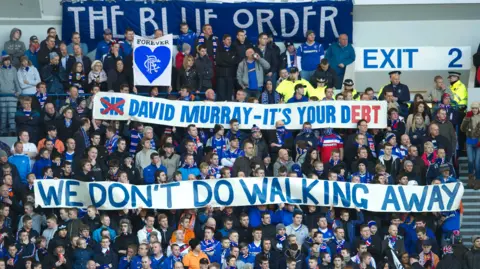 SNS
SNSWhat was known as the “big tax case” centred on the club’s use of Employee Benefit Trusts (EBTs).
EBTs, which were also used by other clubs, enabled Rangers to pay £47m to players, managers and directors between 2001 and 2010 in tax-free loans.
HMRC argued the payments were earnings and should be taxable.
Two tribunals in 2012 and 2014 had previously found in Rangers’ favour but the Supreme Court ruled in favour of HMRC after an appeal in 2015.
The case unfolded against a backdrop of financial meltdown for Rangers.
Years later, Mr Whyte was charged and cleared of taking over the club by fraud.
A court heard that his takeover of Rangers was sealed with a pound coin being tossed across a table in Sir David’s office.
At the time, Mr Whyte had agreed to take on obligations which included paying an £18m bank debt and £5m for players.
Sir David denied failing to carry out due diligence on Mr Whyte, saying: “I went on the facts in front of me.”
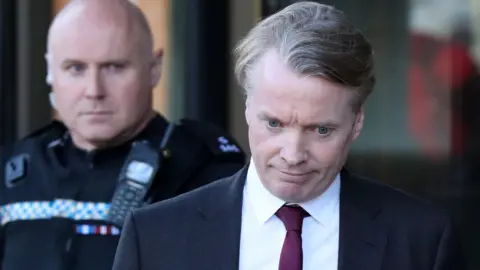 PA Media
PA MediaChallenged on whether it was morally acceptable to deprive the NHS and other public services of funds so millionaire footballers could pay less tax, Sir David replied: “They didn’t do anything illegal.”
“Footballers are getting paid too much. Not just at Rangers, everywhere,” he went on, adding: “It’s avoidance. People do that.”
Sir David denied that the trophies Rangers had won in this period were tainted by the tax arrangements and also denied that the scheme amounted to buying success, or financial doping.
“Not at all,” he replied, adding: “It was proven in the end it wasn’t an illegal tax scheme.”
Sectarianism, steel and Sir Sean Connery
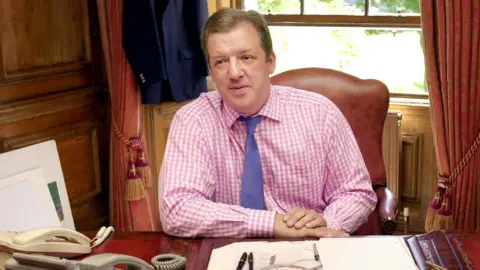 PA Media
PA MediaSir David made his name in the steel industry, forming the company Murray International Metals Limited by the age of 23.
In 1988, he purchased Rangers for £6m and went on to see the club win 15 league championships and 20 domestic Cups.
He and manager Graeme Souness signed the club’s first high-profile Catholic player since World War Two – Mo Johnston, who previously played for Celtic – in 1989.
Reflecting on sectarian tensions in Glasgow, which he described in his book as “vitriol”, Sir David said the continued singing of sectarian songs at Ibrox was not acceptable.
“There’s no place for that in society,” he said. “I don’t think it’s right and I’ve said that and I lost some of the support of the Rangers fans by saying that.”
He also told BBC Scotland News about a business proposal offered to him by media mogul Robert Maxwell in a phone call one day.
Murray told BBC Scotland News: “He said I am thinking of buying Celtic, we could put Rangers and Celtic together as one and they would be a big force.
“I said I don’t think you know the script up here, I don’t think it is practical and I don’t think it would work.”
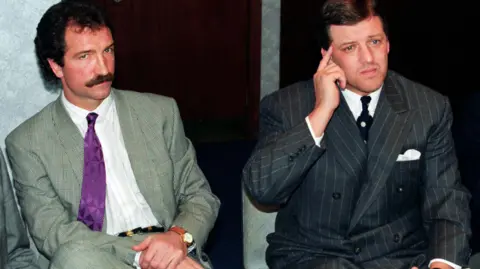 SNS
SNSThe businessman also called for an inquiry into the Scottish government’s involvement in the sale of two steel processing plants in Lanarkshire to the tycoon Sanjeev Gupta.
The sale was backed by a £7m support package from the Scottish government.
Sir David claims ministers rejected his rival bid to purchase the business because it was potentially incompatible with state aid rules, and criticised Mr Gupta’s management of Liberty Steel in the years since.
The Scottish government it had “acted quickly” to support the transaction, adding: “This intervention sustained over 100 jobs at Dalzell and retained steelmaking capacity in Scotland.”
Sir David was also critical of the industrial policies of both the Scottish and UK governments saying: “It’s ridiculous that Britain does not have the capacity to make a steel plate for its defence.”
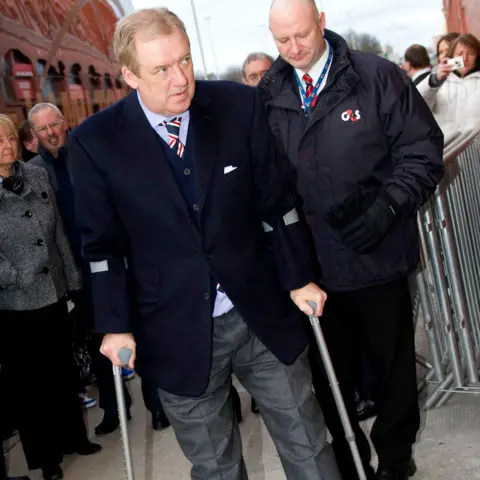 SNS
SNSElsewhere in his book, Sir David describes in detail the car accident in 1976 that led to his legs being amputated at the age of 24, a year after founding his metals business.
On the way home from a game of rugby in his fibreglass Lotus, a tyre blowout sent him off the road and into a tree.
Sir David described how fellow rugby players stopped to help him, using their ties as tourniquets before he was taken to hospital for life-saving surgery.
“None of us know how tough we are until the time we find out how tough we are,” he said.
“I had a young son of several months old and a boy of two. I’d a young wife. My father had just passed away. I could only go one way. I couldn’t fail. I have a responsibility,” he added.
Another chapter in the autobiography is dedicated to Sir Sean Connery, who was a close friend of Sir David’s.
The book describes how the pair travelled to Dunblane in the aftermath of the murder of 16 children and their teacher in the Scottish town on 13 March 1996.
“It was after the terrible news up there that Sean wanted to visit it. And I took him up with some flowers, and quietly he stood for a minute and put some flowers at the school gates. A very difficult moment,” said Sir David.
“He was such a patriot, Sean. He took an interest in Scotland every day and he just wanted to be there.”
Watch all your favorite Amazon Prime Video Sports broadcasts live and free. Get access to NFL, NBA, NASCAR, WNBA, and more – all included with your Prime membership!
